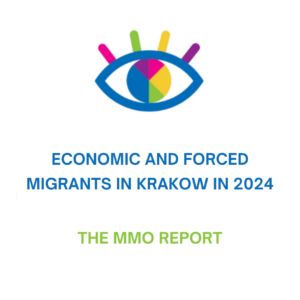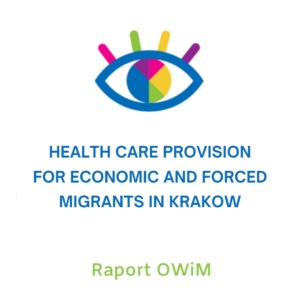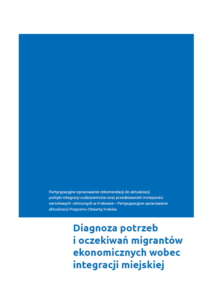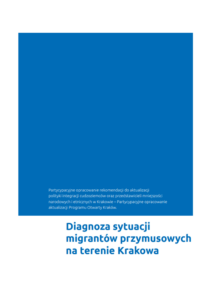Economic and Forced Migrants in Krakow in 2024 (2024)
Authors: Konrad Pędziwiatr, Marcin Stonawski, Jan Brzozowski, Sylwia Szkołut
In 2024, Krakow strengthened its position as a regional center attracting economic migrants from various parts of the world, while remaining “home” for a very large group of forced migrants from Ukraine. At the same time, it remains a very popular destination for student migration. Citizens of European countries (especially from outside the European Union) are most likely to settle in Krakow, but communities from Asia and other parts of the world are also developing dynamically. The report shows changes in the structure of the immigrant population in Krakow in 2024 compared to previous years (up to 2019 inclusive) based on the latest data from various registers (including ZUS, UMK registration information, MUW residence cards or GUP declarations on entrusting work to a foreigner). It also analyzes the significant demographic and socio-economic characteristics of the foreign population in the city and identifies places of their greatest spatial concentration. It also describes in detail their legal situation and participation in the education system and the economy of the city and region.
Health care provision for economic and forced migrants in Krakow (2024)
Authors: Konrad Pędziwiatr, Iwona Bielska, Michał Wanke, Svitlana Luchik-Musiyezdova
The health care system in Krakow is a significant point of contact with foreign patients. It played an important role in providing health services to forced migrants from Ukraine. This population-based analysis of the National Health Fund data, as well as information from Kraków hospitals and the private sector, was conducted to explore the health care utilization patterns of economic and forced migrants in the city since 2019. This study also utilized data from 22 semi-structured interviews with forced and economic migrants, as well as experts from the medical system to illuminate the facilitators and barriers to accessing care, including around language and knowledge about the functioning of the system that may result in disparities in health care access. Ultimately, amid the resilience shown by the health system and its adaptation, we demonstrate how vulnerabilities associated with being a migrant influence health care use patterns, such as seeking medics from similar countries of origin or engaging with the private sector to get access to care.
Economic and forced immigrants in Krakow in 2023 (2024)
Authors: Konrad Pędziwiatr, Marcin Stonawski, Jan Brzozowski, Sylwia Szkołut
Krakow entered 2023 as a city – “home” to a very large group of forced migrants from Ukraine. It was also a year of further growth of increasingly diverse population of economic migrants who decided to settle in the city for short or long term. The largest group of foreigners in Krakow are citizens of European countries (primarily from outside the European Union), but the Asian diaspora is developing in the city particularly dynamically. The report shows changes in the structure of the immigrant population in Krakow in 2023 compared to previous years (up to 2019) based on the latest data from various registers (including ZUS, UMK registration information, MUW residence cards and declarations on entrusting work to foreigners GUP). It also analyzes demographic and socio-economic characteristics of the foreign population in the city and identifies the places of their greatest spatial concentration. It also describes in detail their legal situation and participation in the education system and economy of the city and region.
Diagnosis of the needs and expectations of economic migrants towards urban integration (2023)
Authors: Karolina Czerska-Shaw, Aneta Krzyworzeka-Jelinowska, Oleksandra Tokar
The aim of the report is a diagnosis including an analysis of the social, economic and cultural situation of economic migrants in Krakow, along with identifying the needs, expectations and reflections on the city’s openness in various areas of activity from the point of view of migrant communities. Based on research conducted by the Observatory of Multiculturalism and Migration (OWiM) and other research centers (reports and documents) related to the topic, a review of research and its summary was undertaken in the field of the broadly understood integration of economic migrants in Krakow. Summarizing the analyzes of the social, economic and cultural situation of various migrant communities and areas dealing with issues important to migrants, a diagnosis of the needs and challenges faced by economic migrants in the process of their participation in various spheres of city life was presented. Since there have been significant social changes in recent years, mainly caused by the COVID-19 pandemic and the outbreak of a full-scale war in Ukraine, the above-mentioned aspects were analyzed in order to capture the effects of these changes in the sphere of integration. For this purpose, qualitative research was carried out in the form of in-depth interviews with the so-called social leaders who have migration experience themselves – they come from different countries and regions of the world and represent various social roles (employees in the public sector, activists, employees in non-governmental organizations (NGOs), entrepreneurs, people associated with culture, clerical leaders).
Diagnosis of the situation of forced migrants in Krakow (2023)
Authors: Konrad Pędziwiatr, Wiktor Magdziarz, Sylwia Szkołut, Svitlana Luchik-Musiyezdova
This report was prepared at the request of the Czulent Jewish Association, as part of the implementation of a public task: “Participatory development of recommendations for updating the integration policy of foreigners and representatives of national and ethnic minorities in Krakow – Participatory development of an update of the Otwarty Kraków Program”. The following analysis accompanies the diagnosis of the situation of economic migrants and the diagnosis of the situation of national and ethnic minorities, as one of three research studies that prepare the ground for the evaluation of the “Open Krakow” Program for the years 2016-2022. The detailed purpose of the study, which was carried out for the needs of the presented in this document diagnosis, was the analysis of the social, economic and cultural situation of forced migrants in Krakow, along with the identification of needs in the above areas, which can be taken into account when designing urban public policies, in particular through the “Otwarty Kraków” program.
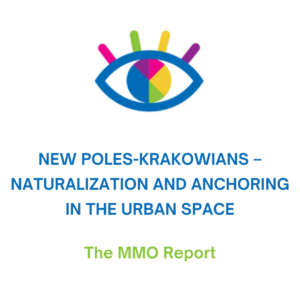
New Poles-Krakowians – naturalization and anchoring in the urban space (2022)
Authors: Joanna Sikorska, Konrad Pędziwiatr, Marcin Stonawski
The number of naturalized citizens in Poland is growing. The status of a Polish citizen can be obtained in three ways: by acquiring citizenship, granting it by the President of the Republic of Poland, and by being recognized as a Polish citizen. The group of new citizens is invisible in official statistics. However, its diversity is evident not only in terms of the country of birth but often also in the reasons for applying for citizenship, civic attitude, observing the traditions of the country of origin, and religion. The report presents the results of research on naturalized citizens in Krakow. First, the structure of this community was outlined based on the available quantitative data. The second part presents the results of qualitative research, which covered new Poles-Krakowians born in many countries and cultural circles. The study contains an analysis of the most important dimensions affecting the identity of new citizens.
Economic and forced immigrants in Krakow in 2022 (2022)
Authors: Konrad Pędziwiatr, Marcin Stonawski, Jan Brzozowski
The brutal Russian invasion of Ukraine from February 24, 2022 onwards has led to one of the biggest humanitarian crises in Europe since the Second World War. Krakow has become a stopping place for hundreds of thousands of war refugees in their escape from their homeland to temporary homes in other parts of Poland and the world. Some refugees also decided to stay in Krakow for a longer period of time, thus contributing to a significant increase in the number of foreigners in the city. This report shows changes in the structure of the immigrant population in Krakow in 2022 compared to 2021, 2020 and 2019 based on the latest data from various registers (e.g. ZUS, UMK registration information, MUW residence cards or declarations of entrusting work GUP foreigner). The report describes the significant demographic and socio-economic characteristics of the foreigners’ population in the city and identifies the places of greatest concentration of immigrants in Krakow. It also describes in detail their legal status and participation in the education system and the city’s economy.
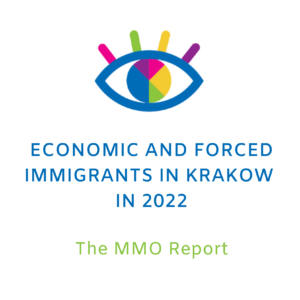
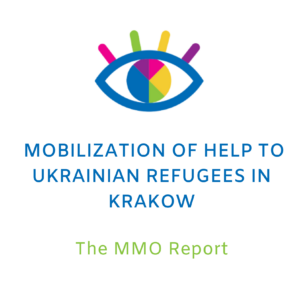
Mobilization of help to Ukrainian refugees in Krakow (2022)
Authors: Karolina Czerska-Shaw, Aneta Krzyworzeka-Jelinowska and Janusz Mucha
The aim of the project is to analise the emerging structural and institutional maps and networks of the mobilization of help in Krakow in the context of forced migrations from Ukraine. Our research documents both individual motivations as well as organizational/institutional challenges and positioning of social actors within these networks. The empirical data consists of in-depth interviews with key stakeholders (n: 34), an online survey amongst volunteers (n: 84), one focus group interview with representatives of both formal and informal organisations, as well as participatory observations.
Forced migrants from Ukraine in Krakow in the light of qualitative research (2022)
Authors: Patrycja Trzeszczyńska, Svitlana Luchik-Musiyezdova, Joanna Dymanus
This report is based on qualitative research and is devoted to the situation of forced migrants from Ukraine and the most important problems of their everyday life in the city, such as housing, labor market, education and childcare, medical care, family situation, pets and plans for the future. In addition, we present here the involvement of migrants from Ukraine in helping refugees from this country arriving in Krakow. The report ends with conclusions and recommendations aimed at better understanding the situation of people who decided to stay in Krakow and wait out the war or start a new life here.
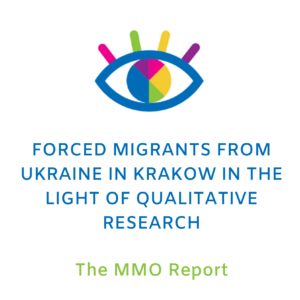
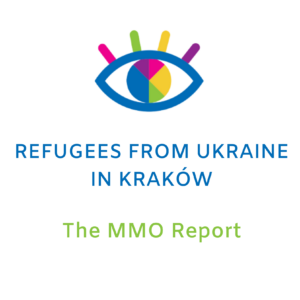
Refugees from Ukraine in Kraków (2022)
Authors: Konrad Pędziwiatr, Jan Brzozowski, Olena Nahorniuk
Report describes the results of a survey of Ukrainian refugees in the early phase of their adaptation in Kraków, in May and June 2022. The report provides an overview of the migrants’ situation: their circumstances in Ukraine, their reception in Krakow and expectations about staying in Poland. It examines refugees needs and their strategies for socioeconomic adaptation. It also assesses how they perceive the refugee reception system in Poland and the response of Polish civil society. The report concludes with a set of policy recommendations for public authorities at the local, regional and national levels.
Integration of immigrants in Krakow and in Małopolskie Voivodeship (2021)
Authors: Konrad Pędziwiatr, Jan Brzozowski, Marcin Stonawski,
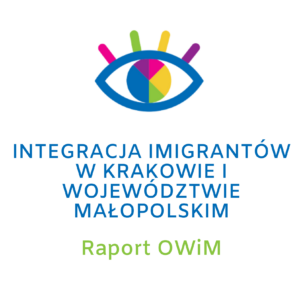
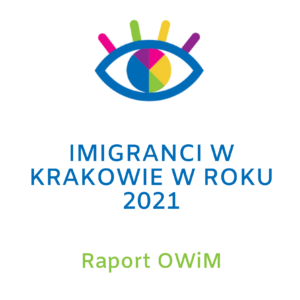
Immigrants in Cracow in 2021– Demographic Report (2021)
Authors: Konrad Pędziwiatr, Marcin Stonawski, Jan Brzozowski
Expats in Cracow (2021)
Authors: Jan Brzozowski, Agnieszka Legut, Konrad Pędziwiatr, Patrycja Trzeszczyńska, Dobrosława Wiktor-Mach
The report presents findings of the study on the community of highly qualified migrants in Krakow. Expats comprise an exceptionally mobile and in many ways privileged category of migrating persons, since they are empowered to shape their own mobility process to a larger extent than others. It is the concept of anchoring rather than the integration perspective that has been chosen as one of the key theoretical frameworks for the analysis presented here. The ‘anchor’ metaphor seems to better reflect the nature of expat’s – usually temporary- stay in a given location. The report focuses on the process of the highly qualified migrants creating an (im) permanent home in Krakow. Yet, first, it outlines – as accurately as possible – the structure of the Krakow expat community by referring to the available quantitative data. Then, it describes various practices and spaces that have become important anchors for the highly qualified migrants in their process of home-making in the city. The qualitative data, which consists of interviews with expats from diverse countries and cultural backgrounds, has helped to illustrate not only the multidimensional process of becoming an inhabitant of Krakow, but also transnational social spaces within which the migrants maintain their contacts across borders, as well as the expats’ potential future mobility projects. The report concludes with the summary of the most important findings and recommendations for the Krakow City Hall.
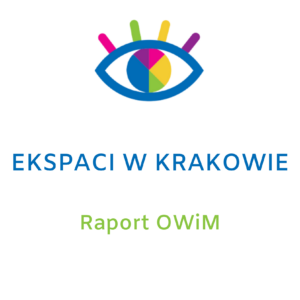
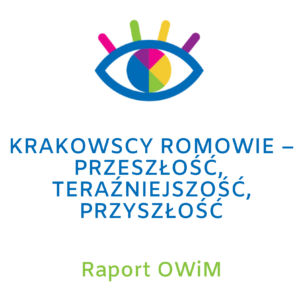
Roma in Cracow. Past, Present, Future (2021)
Authors: Michał P. Garapich, Elżbieta Mirga-Wójtowicz, Monika Szewczyk
This report aims at presenting the current situation of Roma community in Kraków and their needs in the context of creating a set of social and cultural policies by Kraków municipality. First, it presents methodological and ethical basis of this research calling for more participatory approach to ethnic and multicultural policies on urban level. Then it sketches out broad points of contemporary history of Roma in Kraków, and then moves to depict issues related to education, health, civil society and challenges Roma culture and language face today. In the final part the report includes recommendations for municipal authorities, addressing the issues Roma community face, but also which should help the city to promote itself as an inclusive, ethnically and culturally diverse city.
Immigrants in Cracow – Demographic Report (2020)
Authors: Konrad Pędziwiatr, Marcin Stonawski, Jan Brzozowski
This report describes the population of immigrants in Krakow in 2020. It analyses information about foreigners staying in our city, which can be found in various sources of administrative data. The report shows the size of the immigrant population in Krakow and its important demographic and socio-economic characteristics. Moreover, it identifies the places of greatest concentration of immigrants in the city and describes their situation in the education system. Data for the year 2020 is compared with information on foreigners in Krakow in 2019. Thus, the study shows how the population of immigrants in the city is changing. It shows, inter alia, that despite the pandemic, its size is not decreasing. The report also assesses the reliability of various sources of data on immigrants and provides recommendations regarding possible improvements.
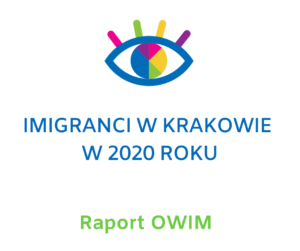
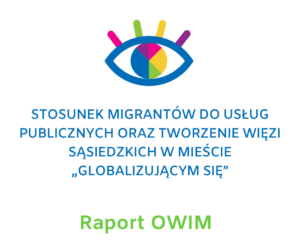
The Relationship Between Foreigners and Public Services and the Development of ‘Nighbourliness’ in a “Globalizing” City: A Case Study of Kraków (2020)
Authors: Paweł Kubicki, Karolina Czerska-Shaw
The report is the result of research analysing the perceptions and experiences of foreigners in using public services in the city of Krakow – a ‘globalising city’ – as well as the social support networks – an aspect of ‘neighourliness’ – that are forged by them in the process. The report is made up of two sections as well as conclusions and recommendations. The first section outlines the theoretical and conceptual frameworks of the study as well as the research aims, methodology and a description of the study sample. The second section of the report presents the analysis and results of the research and is composed of three sub-sections. The first sub-section (chapter 3) analyses the perceptions and assessment of public services in general and the barriers foreigners face in accessing them from a citizen-centric approach, taking into account three levels: the assessment of services ‘at the gates’, ‘through the door’, and ‘at the exit’. This sub-section also outlines and analyses the context of discrimination and unfavourable treatment which foreign nationals experience in using public services. The second sub-section (chapter 4) presents and analyses the detailed results of the study in relation to the five public services taken into account in the study, namely: public health care, public administration, public education, public transport and cultural offers in the city. Chapter 5 is dedicated to the analysis of the type and intensity of civic participation amongst foreigner nationals in the city, the barriers they face in accessing this sphere, and the social support networks and ‘neighbourliness’ that are forged in the process. The last chapter of the report includes the conclusion and recommendations that have been developed on the basis of the presented study and its analysis.
Religious communities in Krakow and migration processes -Report (2020)
Authors: Konrad Pędziwiatr Patrycja Trzeszczyńska, Dobrosława Wiktor-Mach
The aim of the report is to analyse the transformations of religious communities in Krakow resulting from the arrival of an increasing number of foreigners to the city. In recent years, the religious landscape of Krakow has been undergoing significant changes due to influx of immigrants from many regions of the world. New prayer halls and temples emerge, whereas existing places of worship are witness to an increasing number of new foreign believers. Some religious practices are also changing. In some cases, the arrival of new groups of believers necessitates organizational changes, increasing the frequency of religious service or adding additional languages to communication with newcomers. Thus, immigration has a significant impact on the religious life in the city, clearly modifying some existing aspects of it and creating new ones.
The report begins with the discussion of the transformations of Krakow’s multi-religious character in the light of the secondary data. Then, on the basis of the fieldwork carried out by the Authors in 2020, it analyses inter alia the dynamics of the presence of migrants in the largest religious communities in the city, channels through which communities reach immigrants, and foreigners find certain religious communities, reception of foreigners by existing members of communities and clergy, as well as, the influence of migrants on the functioning of selected religious communities. It also describes the functioning of religious communities with significant foreign representation during the coronavirus pandemic. In the final part the report includes recommendations for the City regarding the recognition of the phenomenon and the problems of Krakow’s religious communities and some of their immigrant faithful, revealed in the course of research.
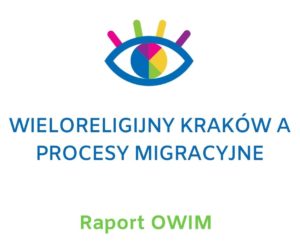
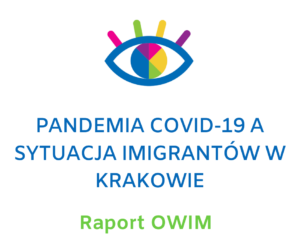
Covid-19 Pandemic and the Situation of Immigrants in Cracow- Report (2020)
Authors: Jan Brzozowski, Karol Kaczorowski, Konrad Pędziwiatr, Dobrosława Wiktor-Mach
The report discusses the results of qualitative research on the impact of the COVID-19 pandemic on the lives of foreigners living in Krakow in 2020. The aim of the study was to identify changes taking place in various dimensions of migrants’ lives, especially economic and social, due to the pandemic. The report shows how the experience of the crisis and the ability to cope with challenges depend largely on the situation of foreigners on the labor market, and especially on the branch of the economy in which they’ve worked. The main difficulties and challenges that the epidemic situation brought to immigrants were also analyzed, including the issues of earnings and (un)stability of employment, problems related to the housing situation, and the functioning of entrepreneurs. The migration dynamics is discussed in the report, both in terms of available statistical data and personal experiences of foreigners. The study also presents various problems with regard to the pandemic that respondents raised in the interviews and those that appeared frequently in discussions in online migrant groups. The issue of support offered to foreigners by various actors is also assessed. The report ends with conclusions with recommendations for the Krakow Municipality.
Immigrants in Cracow – Demographic Report (2019)
Authors: Konrad Pędziwiatr, Marcin Stonawski, Jan Brzozowski
The key objective of this report is to describe the immigrant population in Cracow and to shed light on its size and other demographic and socio-economic features. It presents information on foreigners residing in our city, based mostly on administrative sources (inter alia registers on residence card holders, persons who registered their residence in the City Council, social security registers and information about immigrants in public education registers), supplemented by more innovative approaches to data collection, i.e. usage of big data and information from smartphone users. Consequently, this report identifies the biggest areas of immigrants’ concentration both in terms of residential areas, as for the places of economic/daily activities. The report also assesses the reliability of the aforementioned sources of data and provides recommendations regarding the possible improvement of the quality of data collection.
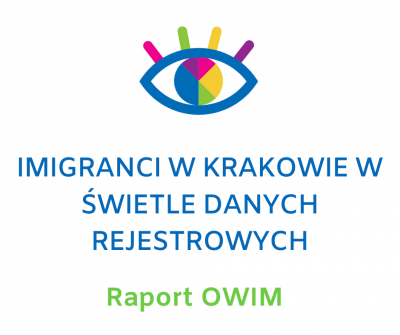
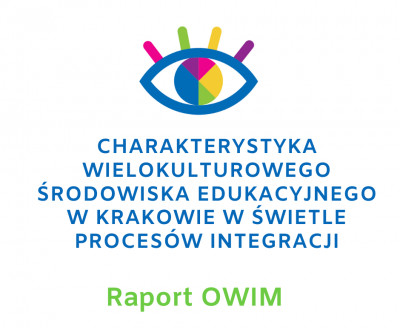
Characteristics of the Multicultural Educational Environment in Cracow (2019)
Authors: Adam Bulandra, Jakub Kościółek, Urszula Majcher-Legawiec, Małgorzata Pamuła-Behrens, Marta Szymańska
This extensive report focuses on the issues such as multicultural education in Cracow in the perspective of comparative cross-regional statistics (pre-school and school education), a background of employees of educational institutions to work in a multicultural setting and the present solutions applied in schools in Cracow related to the presence of students who had experienced migration. A part of the report focuses on recommendations on the support of multicultural competences of teachers, educational workers, students and preschool pupils; management of education in the context of migration – organization of work of schools and kindergartens and support of competences of workers working in the sector; tasks of the pedagogical supervisors related to the multicultural educational setting; support for schools multicultural development.
Foreigners at Cracow Universities (2019)
Authors: Janusz Mucha and Konrad Pędziwiatr
The report focuses on the presence of foreigners at higher education institutions of Cracow. The most important issues covered are academic migrations as a type of international mobility, dynamics of academic migration to Poland, foreign students in Poland and Cracow according to the newest statistical data, recruitment policies of universities in Cracow, integration of foreign students in Cracow, towards the better integration – providing care for foreign students, places of residency of foreign students in Cracow, foreign students on the labour market – alumni and work in Poland, informal cultural life of foreign students in Cracow, foreign employees of universities in Cracow (2012 and 2015-17). Recommendations for the municipality are included in the report and concern monitoring and regulation (if it is possible and adequate) of foreign student and academic migration to Cracow.
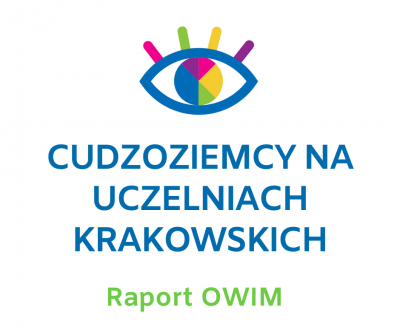
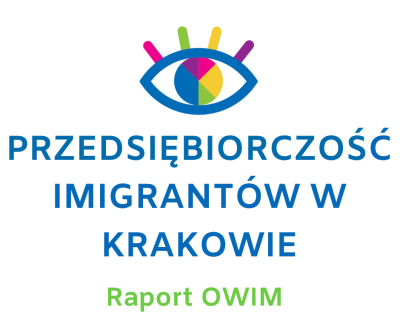
Immigrant Entrepreneurship in Cracow (2019)
Author: Jan Brzozowski
This report presents an overview of the current situation of immigrant entrepreneurship in the municipality of Cracow, with the main focus on the newest wave of Ukrainian immigrants. It aims to analyse the development perspectives of immigrant firms, main sectors and business models, the obstacles faced by entrepreneurs and the main constraints of their business activities. Finally, the report identifies the main challenges and provides policy recommendations for support schemes directed at immigrant entrepreneurship and economic integration of newcomers at the local and regional level, with a particular emphasis on the Cracow metropolitan area.

